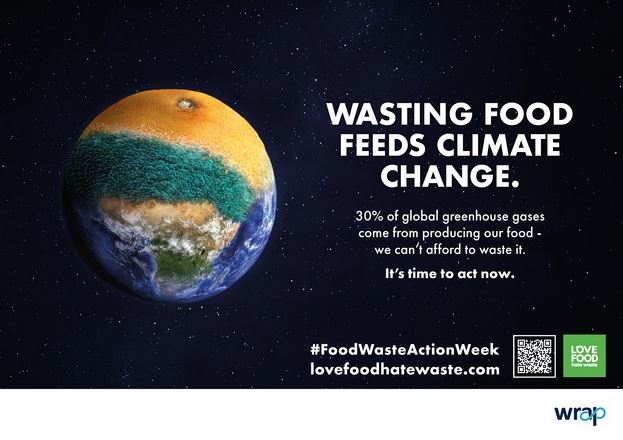Food waste impacts our planet, society, and the economy: it drives climate change, threatens global food security, and it’s costly to manage. Because of this, it’s currently one of the main enemies to sustainability.
Fortunately, while wasting food is harmful, it can also be easy to avoid! To support the Food Waste Action Week, and to help you make the most of it, we’ve put together a list of 11 simple ways to achieve this.

Shop smart
Buying more than you need is the first step towards wasting food, before even reaching the kitchen. To avoid this, make a list of all the ‘essentials’ – a base of products that you always need to have on hand. Before going grocery shopping, check what you need against this list, and add any extras (ingredients for a special recipe, snacks, etc.). This method will help you avoid wandering between the shelves, trying to remember what you wanted to buy. And if you don’t have time to make a list, take some quick pictures of your fridge and cupboards and use them as a guide. Here you can find more advice for making shopping lists. Another tip is choosing small and frequent trips instead of buying everything in bulk. This way, you only buy what you need, and you can also eat fresh produce more often, without worrying about it perishing. Lastly – never shop hungry to avoid loading your cart with what you don’t need.
Buy “ugly” fruit and veggies
The less visually appealing produce is often left behind and wasted in shops, even despite being perfectly safe to eat. In fact, to stop this from happening, many supermarkets, such as Aldi and Tesco, started selling their “wonky” produce at reduced prices in an attempt to cut down food waste. Look for these the next time you’re shopping for potatoes or carrots.
Make it last
Once the food is in your kitchen, make sure you store it correctly – use this guide by Love Food Hate Waste to learn how. Also, check out their Chill The Fridge Out tool to make sure that you’re keeping your foods at the right temperature. Another great way of making food last is through preservation methods, such as fermenting – see this guide to learn the basics of this process.
FIFO
“First In, First Out”. It’s a standard practice in shops and restaurants – and it’s also a great system to follow at home! The basic principle is that foods which have been stored the longest, need to be eaten first. This rotation method helps make sure that all products are used up before expiring.
Organize your fridge
Keeping your fridge free of dirt and clutter makes it easier to clearly see what foods you have. It will also help you implement the FIFO system. Plus, a dirty fridge can contaminate your food and make you ill!
Freeze it
This is the quickest and most versatile way of extending the shelf-life of products. It’s especially useful for the most wasted food in the UK – bread. Whenever you buy a loaf, slice up and freeze half; only take it out when you use up the rest. You can put slices straight from the freezer to the toaster – they will taste the same as your regular toast! Ice cube trays can also come in handy: you can use them to freeze leftover milk (one ice cube is a perfect amount for a cup of tea!) and herbs (chop them up, put them in the tray with some oil, and then throw them on the pan the next time you’re cooking).
Learn the language
Understanding food date labels is key to avoid unnecessary food waste. In short, the ’Use By’ label is used to mark the date by which the food needs to be eaten to be safe. ‘Best Before’ is about quality – after this date, the product might become less appealing, but it can still be eaten. Read this quick guide by Love Food Hate Waste to learn more.
Know your portions
Preparing too much food can result in overeating, wasting money, and waste. Use this portion planner to learn how much food is enough for the number of meals or people you’re cooking for. Once you know how much of a product to use, you can avoid cooking too much of it the next time.
Eat leftovers
Using your leftovers is not only a great way to reduce your food waste, but also a good opportunity to learn to cook something new! Love Food Hate Waste have lots of recipes to help you out – you can find them all here.
Use it up
There are at least three simple ways of using up all parts of products which you don’t want to eat whole. The first one is blending – make smoothies or creamy soups and throw in ends of carrots and strawberries, or stems of kale and broccoli. The second is making stock – sauté with oil your scraps from chopping and peeling, then add some water and simmer to make stock. Finally, you can also roast peels from veggies such as carrots and potatoes to make a delicious side dish!
Compost the rest
Some food waste might be especially difficult to avoid – we’re talking about egg shells or certain fruit peels. The good news is that we can still make sure that these don’t end up in general waste – by composting! Here you can find some practical information on why and how to start composting at home. And if you don’t have a garden, don’t worry! Read here about tabletop composting.
______________________________________________________________________________
What are your favourite ways to avoid food waste? Share them with us on social media and tag #GoGreenSalford to take part in our challenge! It runs all the way until April 22nd, so there’s also plenty of time to try out some of these tips!
Please only share pictures you are happy to be re-shared on the University of Salford Environmental Sustainability Team social media. Please also note that if you’ve got a private account on Twitter or Instagram, we won’t be able to see them – but you can instead send us the pictures, and we’ll share them.
Source: Love Food Hate Waste / WRAP UK
